
Sponsored Ads
|
» Home
» Bilingual » Faust Vrancic 1551-1617 Memorial Center on the island of Prvic near the town of Sibenik in Croatia
» Home
» Croatian Language » Faust Vrancic 1551-1617 Memorial Center on the island of Prvic near the town of Sibenik in Croatia
» Home
» Science » Faust Vrancic 1551-1617 Memorial Center on the island of Prvic near the town of Sibenik in Croatia
» Home
» People » Faust Vrancic 1551-1617 Memorial Center on the island of Prvic near the town of Sibenik in Croatia
» Home
» History » Faust Vrancic 1551-1617 Memorial Center on the island of Prvic near the town of Sibenik in Croatia
» Home
» Education » Faust Vrancic 1551-1617 Memorial Center on the island of Prvic near the town of Sibenik in Croatia
» Home
» Culture And Arts » Faust Vrancic 1551-1617 Memorial Center on the island of Prvic near the town of Sibenik in Croatia
| Faust Vrancic 1551-1617 Memorial Center on the island of Prvic near the town of Sibenik in Croatia |
| By Darko Žubrinić |
Published
10/8/2014
|
Bilingual , Croatian Language , Science , People , History , Education , Culture And Arts
|
Unrated
|
|
|
|
Lexicographer and inventor of parachute as we use today, suspension bridge and wind turbine
Faust Vrancic 1551-1617, distinguished Croatian inventor and encyclopaedist
Summary. Faust Vrančić was a distinguished Croatian inventor and encyclopaedist during the Renaissance time on 16/17th centuries. Among his most important inventions we mention the parachute as we use today (very different from Leonardo da Vinci'c), suspension bridge and wind turbine. He wrote an important five language dictionary of the most noble Eureopan languages, which included Latin, Italian, German, Croatian and Hungarian. Faust Vrančić, born in the town of Šibenik, now has a superb Memorial Center on the nearby island of Prvić, where he was burried according his last wish.
| 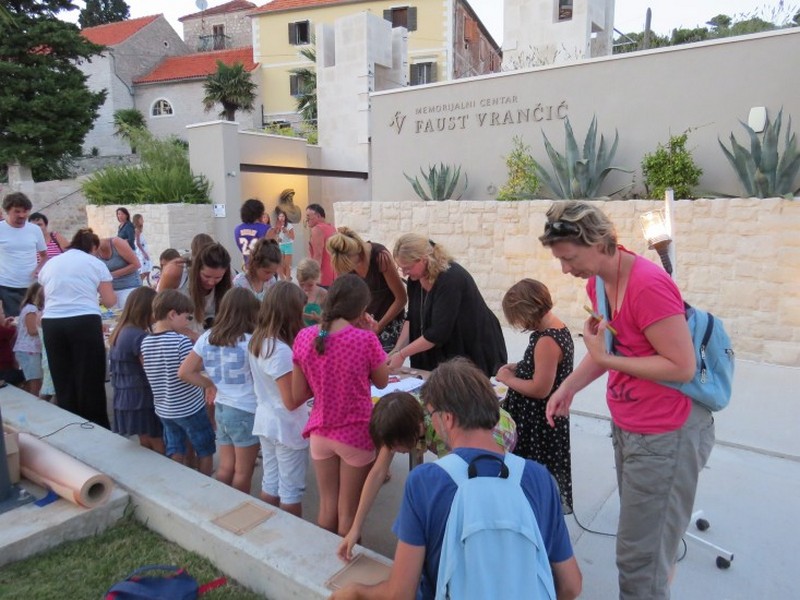 Memorial Center of Faust Vrančić on the island of Prvić near the town of Šibenik in Croatia 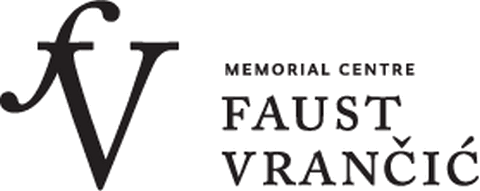 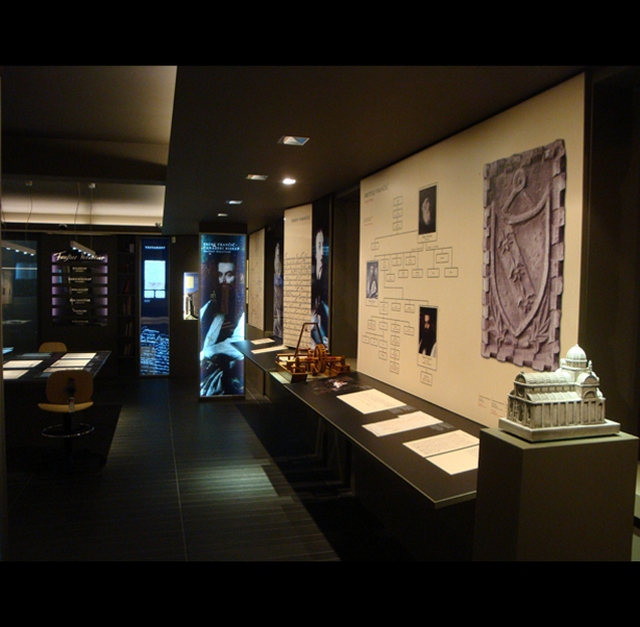
Život Fausta Vrančića
Priča o Faustu Vrančiću, i danas, nakon stoljeća istraživanja njegova života, još uvijek nije u potpunosti ispričana. Ovaj svestrani znanstvenik i inovator, autor mnogih leksikografskih, filozofskih i pjesničkih djela, rođen je u Šibeniku 1551. godine gdje je stekao osnovno humanističko obrazovanje. Potječe iz stare Šibenske obitelji čiji ga je najpoznatiji član Antun Vrančić još u ranoj mladosti prigrlio i brinuo o njegovom odgoju i obrazovanju.
Djetinjstvo je Faust proveo na otoku Prviću u Šepurini.
U to doba, kako piše Mihovil Vrančić svom bratu Antunu, Faust je "dijete živa duha, lijepe i uistinu plemenite vanjštine; nije nerazuman niti djetinjasto zaigran, čini se da ima izgleda za značajniju budućnost...", te ga moli da ga uzme k sebi kako "ne bi ovdje od djetinjstva upijao ove divljačke običaje, nego da od malih nogu dobiva čistiju poduku i uči jezike".
Iako Antun Vrančić nije starao samo o Faustu, u njegov odgoj i obrazovanje uložio je najviše ljubavi, truda i novca. Omogućuje mu da studira pravo u Padovi i Venciji. Ovdje mladi Faust uči i napreduje, ali voli zabavu, društvo i prijatelje, te vodi tipični studentski život, pa iz tog razdoblja čitamo ne mali broj pisama u kojem ga Antun grdi zbog rastrošnosti, raskalašenog života i mladenačke usijanosti.
Samo nakratko, po završetku studija vraća se u svoj voljeni Šibenik koji je međutim pretijesan za radoznali Faustov duh, pa on odlazi u Ugarsku gdje je stric Antun kraljev namjesnik. Za vrijeme boravka u Šibeniku postaje članom bratovštine Sv. Jeronima s kojom će uvijek održavati bliske veze zbog ljubavi prema domovini i rodnom gradu.
U Ugarskoj njegovi se interesi usmjeruju k pročavanju tehnike i znanosti. Nažalost, to je i vrijeme kad umire njegov pokrovitelj, stric Antun. Faust biva imenovan upraviteljem biskupskih imanja u Veszpremu gdje se susreće s problemima održavanja i gospodarenja velikom utvrdom. Praktična znanja stečena na vesprimskom imanju, dobro će mu poslužiti za razvoj strojeva kasnije objavljenih u knjizi Machinae Novae.
Godine 1578. ženi se Mariom Zarensis s kojom dobiva kćer Alba Rozu i sina koji umire jako mlad. Postaje tajnik na dvoru Rudolf II., rimsko njemačkog cara i hrvatsko-ugarskog kralja koji stoluje u Pragu. Rudolf II, mecena umjetnosti i znanosti, zaljubljenik u astronomiju, astrologiju, pa i alkemiju na hradčanskom dvoru okuplja najveće onodobne umove i upravo će boravak u Pragu biti značajan za daljni rad i napredovanje našeg Fausta. Ovdje prijateljuje s Jacopom de Stradom koji najviše utječe na oblikovanje Faustovih ideja o tehničkim pronalascima.
Iz praške prijestolnice odlazi naglo, najvjerojatnije pogođen iznenadnom smrću supruge. Napušta mjesto dvorskog tajnika, na kratko se vraća u svoj Šibenik, pa zatim u Veneciju i zaređuje se.
Godine 1598. Rudolf II. ga proglašava titularnim biskupom Csanada, kojeg naslova se Faust odiče 1605. godine i odlazi u Rim gdje pristupa crkvenom redu barnabita. Ponovno se, nakon godina provedenih u diplomaciji i politici, posvećuje svojim starim zanimacijama, proučavajući konstrukcije strojeva i riješavajući arhitektonske probleme.
Naime, ne treba smetnuti s uma da su u vrijeme Fautova života tehničke znanosti koje danas poznajemo, fizika, mehanika pa i matematika bile tek u povojima i da su njegova inovatorska rješenja najvećim dijelom nastala intuitivno. Promatranjem i kroz iskustvo koje je stekao kao upravitelj vesprimskog imanja, načinio je nacrte 56 uređaja, koja uključuju inovativna rješenja izrade mlinova na vodeni i na vjetreni pogon, raznih naprava za prenošenje teških konstrukcija, mostova, od kojih je najuzbudljiviji onaj izrađen od bronce, mnogo različitih satova... Ove je izume sakupio u zbirku Machinae Novae koja je izdana pred sam kraj njegova života. Knjiga sadrži 49 bakropisa s komentarima na latinskom, talijanskom, španjolskom, francuskom i njemačkom jeziku.
Iako ga svijet danas poznaje kao izumitelja Homo Volansa, letećeg čovjeka, ne treba zaboraviti ni njegova ostala djela, povijesna, filozofska pa i lirska, pisana na latinskom jeziku koja odišu renesansnim duhom.
Vrlo značajna ostavština Fausta Vrančića je i njegov petojezični rječnik pod nazivom Rječnik pet najplemenitijih jezika Europe (Dictionarium quinque nobilissimarum Europae linguarum, latinae, italicae, germanicae, dalmaticae et ungaricae) koji je bio, ne samo prvi hrvatski, već i prvi mađarski rječnik.
Shrvan bolešću Faust umire u Veneciji 27. sječnja 1617. godine. Naslutivši da se bliži kraj njegova ovozemaljskog puta, u oporuci navodi želju da se njegovo tijelo položi u crkvu Svete Marije od Milosti u Prvić Luci.
Tako je veliki čovjek, stanovnik sjajnih europskih dvorova, cijenjeni tajnik cara Rudolfa II., biskup od Csanada i kraljevski namjesnik za Ugarsku i Transilvaniju, genijalni renesansni duh pokopan u skromnoj prvićkoj crkvi, na otoku gdje je proveo najsretnije dane svoga djetinjstva, u hrvatskoj zemlji na koju je bio ponosan i čije je porijeklo stalno isticao potpisujući se: Fausto Verancio Siceno gdje ovim potonjim pridjevom naglašava svoju nacionalnu pripadnost i domoljublje.
Izvor http://www.mc-faustvrancic.com
|
Life of Faust Vrančić
The story of Faust Vrančić even today, after a century of research into his life, has not yet been fully told. This versatile scientist and inventor, author of many lexicographical, philosophical and poetic works, was born in Šibenik in 1551, where he gained a basic humanities education. He came from an well-known Šibenik family whose best known member is Antun Vrančić, who took him in during his early youth and cared for his formation and education.
Faust spent his childhood on the Island of Prvić in Šepurina.
At that time, as Mihovil Vrančić wrote to his brother Antun, Faust is a "lively-spirited child, possessing a beautiful and truly noble exterior; he is not unreasonable no excessively childish, it seems that he has a significant future ahead of him..." and asks him to take care of him so that "he might not absorb these savage customs in his childhood, but instead from an early age acquire a purer teaching and learn languages ."
Although Antun Vrančić did not only took care of Faust, he vested in his education mostly love, effort and money. He provided him with the opportunity to study law at Padua and Venice. Here the young Faust learnt and made progress, but he liked having fun, the company of others and friends, and experience the typical life of a student; hence, from that period we read quite a few letters in which Antun scolds him for his extravagance, life of luxury and youthful fire.
Only for a short time, upon graduation he returned to his beloved Šibenik, which was however too cramped for Faust's curious soul, so he went to Hungary, where his uncle Antun was the regal governor. During his stay in Šibenik, he became a member of the brotherhood of St. Jerome, with whom he always maintained close ties due to his love of his homeland and hometown.
In Hungary, his interests became absorbed in studying engineering and science. Unfortunately, it is also a time when his patron died, his uncle Antun. Faust was appointed administrator of the bishop's estates in Veszprem where he encountered the problems of maintaining and managing a large fortress. His practical knowledge gained at the Veszprem property will service him well in developing the machines later published in his book Machinae Novae.
On 1578, he married Maria Zarensis from whom he received a daughter Alba Roza and a son who died very young. He became secretary at the court of Rudolf II, of the Roman-German Emperor and of the Croatian-Hungarian king who resided in Prague. Rudolf II, a patron of the arts and sciences, an enthusiast in astronomy, astrology, and alchemy, gathered at the Hradčan court the greatest minds of the time and it was Faust's stay in Prague that will be important for the future work and progress of our Faust. Here he becomes friends with Jacopo Strada who most influenced the shaping of Faust's ideas on technical discoveries.
He leaves the Prague capital abruptly, probably affected by the sudden death of his wife. He leaves the position of royal secretary, briefly returns to his Šibenik, and then goes to Venice where his is ordained.
In 1598, Rudolf II proclaims him the Titular Bishop of Csanád, the title Faust renounced in 1605, after which headed off to Rome, where he joined the religious order Barnabites. Again, after years spent in diplomacy and politics, he again dedicates himself to his old occupations, studying the construction of machines and solving architectural problems.
Specifically, we must not forget that at the time Faust's life, technical sciences as we know them, physics, mechanics and mathematics were in their infancy and that his innovating solutions were largely intuitively based. Through observation and experience, which he acquired as the administrator of the Veszprem estates, he made sketches of 56 devices, which included the development of innovative solutions for mills that were water and wind-powered, various devices for carrying heavy construction, bridges, of which the most were those made of bronze, many different watches... These inventions gathered in the volume Machinae Novae, was released before the end of his life. The book contains 49 sketches with commentaries in Latin, Italian, Spanish, French and German.
Though the world today knows of him as the inventor of the Homo Volans, the flying man, we should not forget his other works, historical, and philosophical and lyrical, written in Latin, which reflect the spirit of the Renaissance.
A very important legacy of Faust Vrančić is his five-language dictionary named Dictionary of the Five Most Noble European languages (Dictionarium quinque nobilissimarum Europaea linguarum, latinae, italicae, germanicae, dalmaticae et ungaricae) which was not only the first Croatian, but also the first Hungarian dictionary.
Overcome with illness, Faust died in Venice on 27th January 1617. Sensing that the end of his earthly times was near, in his last testament, he stated his desire to have his body was laid in the church of St. Mary of Mercy in Prvić Luka.
It was In this way that this great man, a resident of the grandest European courts, a valued secretary of Emperor Rudolf II, Bishop of Csanád and royal governor of Hungary and Transylvania, a brilliant renaissance spirit was buried in a modest Prvić church on the island where he spent the happiest days of his childhood in the the country of Croatia of which he was proud, and whose origin he constantly emphasised by signing himself as Fausto Verancio Siceno, where the latter adjective emphasised his nationality and patriotism.
Source http://www.mc-faustvrancic.com
| Many thanks to Mrs. Mirna Lipovac, Zagreb, for her first information about the Museum of Faust Vrancic on the island of Prvić
Memorial Center of Faust Vrančić and young followers of Faust
Faust Vrančić
The first technical discoveries are related to the name of Faust Vrancic (lat. Faustus Verantius, italianized name Fausto Veranzio, hungarized name Faustus Verancsics, 1551-1617). It is known that he collaborated with Tycho Brache and Johannes Keppler. Vrancic was fluent in at least seven languages. At the court of King Rudolph II in Hradcani in Prague (Rudloph II was Roman-German Emperor and Croatian-Hungarian King) he worked as his secretary, and in that period completed his important dictionary of five most noble European languages (Dictionarium quinque nobilissimarum Europeae linguarum: Latinae, Italicae, Germanicae, Dalmaticae et Hungaricae) and published in Venice in 1595. He is best known for his book of inventions in Machinae Novae, published also in Venice in 1595. The book was financially supported by the French King Louis XIII, and the Toscan Duke Cosimo II de Medici. Among his numerous inventions the most famous is the parachute, which he tested in Venice. It is true that Leonardo da Vinci had a similar idea earlier, but he made only a rough sketch of it, of pyramidal shape, while Vranic's parachute had rectangular shape, as today. 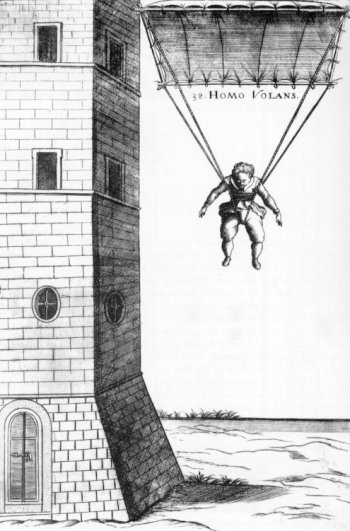
Vrancic also constructed a mill driven by tides, ropeway, gave a new construction of metal bridges (suspended by iron chains, i.e. suspension bridges), described in his famous book on mechanics Machinae novae (61 constructions, Venice, 1595). It was not until the late 18th century, that is, two centuries later, that such bridges were built. The book was soon translated from Latin into Italian, Spanish, French and German. A sketch of his well known Homo volans (parachutist) appearing in Machinae novae is often attributed to Leonardo in the literature, which is wrong. Vrancic was the Chancellor of king Rudolph II for Hungary and Transylvania. 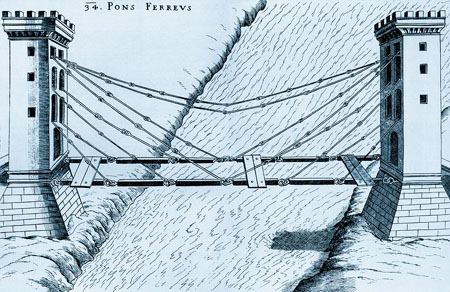
See Faust Vrancic (by dr. Vladimir Muljevic, in Croatian) For example, the famous Verrazzano Narrows Bridge is the largest suspension bridge in the USA (New York, 1298 m), see also Historical Develpment of Iron and Steel in Bridges. 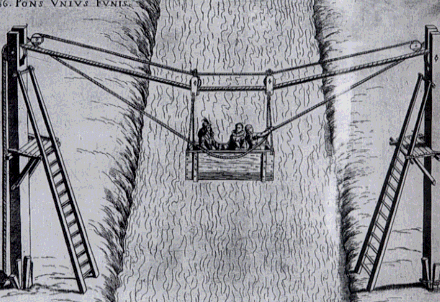 Vrancic also described in his book Machinae Novae the first wind turbine: 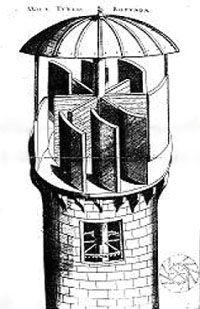 Vrancic's Machinae Novae, 1595, was reprinted - in 1965 by "Heinz Moos Verlag", Munich, Germany (F. Klein, A. Wisner), translated into five languages,
- in 1968 by "Ferro", Milano, Italy (Umberto Forti), in Italian
- in 1985 by "Magveto", Budapest, Hungary, in Hungarian,
- in 1993 by "Novi Liber", Zagreb, Croatia (Vladimir Muljevic, Zarko Dadic), in Latin and Croatian (from the introduction:
"...This book is issued in dramatic time for Sibenik and its environs, for Dalmatia, and the whole of Croatia [that is, issued during Greater Serbian 1991-1995 aggression on Croatia]. The aim and importance of this book should be close and clear to any civilized person: it radiates with Renaissance spirit of activism and optimism that we also wish to develop in our time, despite all misfortune brought to us by imposed war...")
Source www.croatianhistory.net
Faust Vrancic (or Faust Verantius, 1551-1617) from Sibenik was the author of a five language dictionary "Dictionarium quinque nobilissimarum Europeae linguarum: Latinae, Italicae, Germanicae, Dalmaticae et Hungaricae" (Venice, 1595), with more than 5000 words (i.e. altogether 25000 words), where Dalmaticae means Croatian language. Indeed, in his dictionary the words Dalmata, Dalmatia, Dalmaticae are translated as Croat, Croatian land, Croatian respectively. It is known that Vrancic was fluent in at least seven languages. See p. 13 of his Dictionarium: 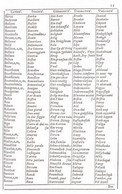
Faust Vrancic considered that the Dalmatian language was the most beautiful among Slavic languages, and that it was spoken from Adriatic sea to rivers of Drava and Danube. In the second edition to his dictionary, issued in collaboration with a Prague Benedictine Petar Loderecker, the Latin description of Dalmatian language was given as follows: the Croatian language. See [Malic, Na izvorima hrvatskoga jezika, p. 28]. 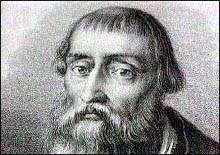
In the appendix to his dictionary he gave a list of several hundred Croatian words that entered the Hungarian language (Vocabula dalmatica quae Ungri sibi usurparunt). His book had a great influence on the formation of both Croatian and Hungarian orthography (Hungarian orthography accepted most of Vrancic's suggestions - usage of ly, ny, sz, and even cz, see [Hrvatska/Madarska], p. 94). It represents also the first dictionary of Hungarian language. The book had six editions, three of them out of Croatia: in Venice, Prague and Pozun (Bratislava).
Vrancic's dictionary is dedicated to Alfonso Carillo, a Spanish Jesuit who supported its publication. His work was an important source for the creation of several subsequent European dictionaries: Hungarian - Italian dictionary written by Bernardino Bali, "Thesaurus polyglottus" by a German humanist and lexicographer Hieronim Megister (1603, "editio secunda " in 1613), and "Dictionarium septem diversarum linguarum (Videlecit Latine, Italice, Dalmatice, Bohemice, Plonice, Germanice et Ungarice)" written by a Czech Benedictine Peterus Lodereckerus Pragensus in 1605. 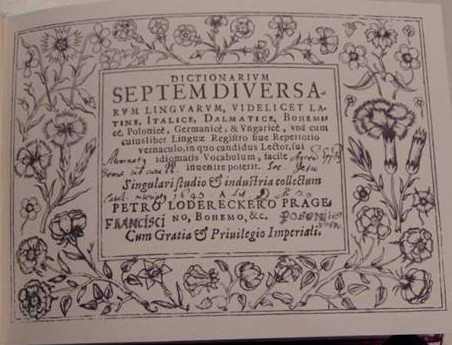
Peter Loderecker: Dictionarium septem diversarum linguarum, Videlecit Latine, Italice, Dalmatice, Bohemice, Polonice,
Germanice et Ungarice, Prague 1605
Faust Vrancic was a chancellor on the Court of king Rudolph II in Prague (Hradcany) from 1581 to 1594, where also a famous musician Adrian de Vries, astronomer Tycho Brache, mathematician and astrologer Johannes Kepler were present. He also wrote about logic and ethics. However, his major contributions are related to numerous technical inventions. Faust Vrancic, scrollable books, National and University Library, Zagreb Source www.croatianhistory.net
| 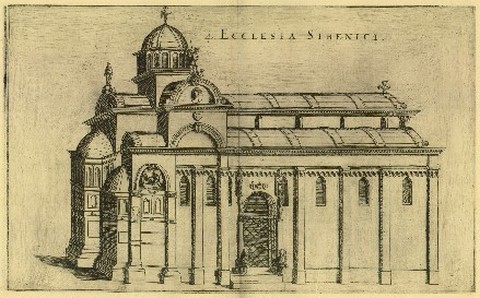 Drawing of the Šibenik Cathedral in "Machinae Novae" by Faust Vrancic (1551-1617). Built during the Renaissance period, the Šibenik Cathedral is a top monument of Croatian culture. It has been shelled during the Serbian agression on Croatia 1990-1995. Drawing of the town of Šibenik from the 15th century where Faust Vrančić was born in the same century.
Šibenik is quite close to one of the most beutiful national parks in Europe: Waterfalls of the Krka river
Contact
Faust Vrančić Memorial Centre
Prvić Luka bb
22233 Prvić Luka, Island of Prvić
OIB 20110229694
IBAN HR9824110061191000795
Telephone-fax +385 (0)22 448-128
—
Ivana Skočić, Centre Director
+385 (0)91 524 0739
e-mail voditeljica@mc-faustvrancic.com
Bartul Jurlin, Technical Associate
+385 (0)92 238 2923
e-mail tehnicki@mc-faustvrancic.com
—
Working hours (1st September - 30th June)
Monday - Saturday 8 am - 4 pm
Summer working hours 1st July - 31st August)
Monday 9 am - 4 pm
Tuesday - Sunday 9 am - 10 pm
we open outside of working hours for group visits (minimum 20 persons) by appointment five days notification in advance
The Centre does not work on:
1st November (All Saints Day)
25th and 26th December (Christmas Day)
31st December and 1st January (New Year's Eve and New Year's Day)
6th January (Epiphany)
Audio guide
Croatian, English, German, Italian and French
Use of the once only guide - 20 kn
Use of this guide is free for the blind and visually impaired
—
The Centre has unhindered access for people with disabilities (ramps for stairs). It is necessary to provide prior notification in order to ensure an escort.
Source http://www.mc-faustvrancic.com/en/Kontakt/
| Formated for CROWN by Darko Žubrinić
Distributed by www.Croatia.org . This message is intended for Croatian Associations/Institutions and their Friends in Croatia and in the World. The opinions/articles expressed on this list do not reflect personal opinions of the moderator. If the reader of this message is not the intended recipient, please delete or destroy all copies of this communication and please, let us know!
|
|
|